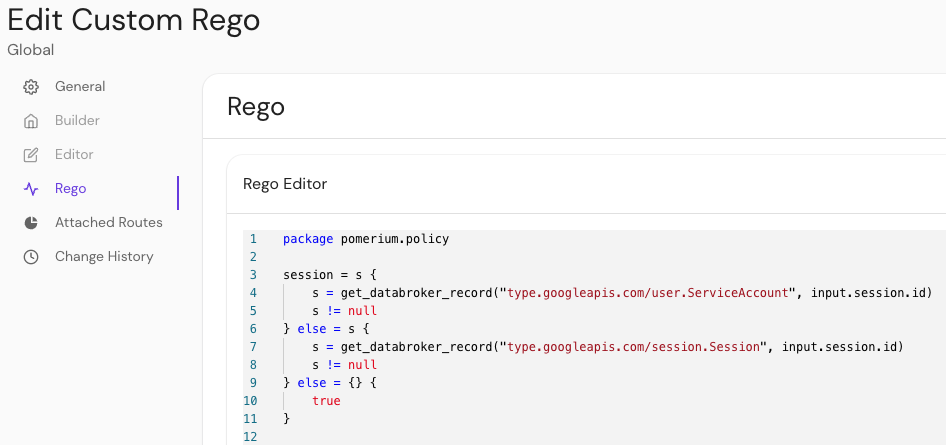Custom Rego Policies
Pomerium supports policies expressed in Rego for organizations that prefer to use OPA.
See the Outputs, Inputs, and Functions reference sections below to learn how Rego policies apply to policy evaluation.
Pomerium Enterprise
Custom Rego policies is a Pomerium Enterprise feature.
In the Enterprise Console, you can write custom Rego policies in the Rego Editor:

A policy can only support PPL or Rego. Once one is set, the other tab is disabled.
Outputs
Authorization policy written in Rego is expected to return results in allow and/or deny rules:
# a policy that always allows access
allow := true
# a policy that always denies access
deny := true
Pomerium grants access according to the same rules as PPL:
Only two actions are supported: allow and deny. deny takes precedence over allow. More precisely: a user will have access to a route if at least one allow rule matches and no deny rules match.
allow and deny rules support four forms:
- A simple boolean:
allow := true
- An array with a single boolean value:
deny := [true]
- An array with two values: a boolean and a reason:
allow := [false, "user-unauthorized"]
- An array with three values: a boolean, a reason, and additional data:
allow := [false, "user-unauthorized", { "key": "value" }]
The reason value is useful for debugging, since it appears in authorization logs. There are two special reasons that trigger functionality in Pomerium:
user-unauthenticatedindicates that the user needs to sign in, and results in a redirect to the Authenticate servicedevice-unauthenticatedindicates that the user needs to register a new device
Inputs
Rego scripts are evaluated with inputs available on the input object:
allow if input.http.method == "POST"
Rego defines the following inputs:
| Input name | Type | Description |
|---|---|---|
http | Object | Represents the HTTP request |
http.method | String | The method used in the HTTP request |
http.hostname | String | The hostname in the HTTP request |
http.path | String | The path in the HTTP request |
http.url | String | The full URL in the HTTP request |
http.headers | Object | The headers in the HTTP request |
http.client_certificate | Object | The client certificate details |
http.client_certificate.presented | Boolean | true if the client presented a certificate |
http.client_certificate.leaf | String | The leaf certificated provided by the client (unvalidated) |
http.client_certificate.intermediates | String | The remainder of the client certificate chain |
http.ip | String | The user's IP address |
http.session | Object | Represents the user's session |
http.session.id | String | The session ID |
http.is_valid_client_certificate | Boolean | true if the presented client certificate is valid |
Functions
The function below is available in Rego scripts:
get_databroker_record(record_type, record_id): Returns data from the Databroker service.
For example:
session := get_databroker_record("type.googleapis.com/session.Session", input.session.id)
Example Rego policy
This example policy compares the given_name claim from a user's session against a list of popular first names, and only allows the 100 most popular first names.
package pomerium.policy
session = s {
s = gset_databroker_record("type.googleapis.com/user.ServiceAccount", input.session.id)
s != null
} else = s {
s = get_databroker_record("type.googleapis.com/session.Session", input.session.id)
s != null
} else = {} {
true
}
user = u {
u = get_databroker_record("type.googleapis.com/user.User", session.user_id)
} else = {} {
true
}
allow = [true, {"custom-rego-authorized"}] {
# grab all the claims from the user and session objects
session_claims := object.get(session, "claims", {})
user_claims := object.get(user, "claims", {})
all_claims := object.union(session_claims, user_claims)
# get the given_name claim. claim values are always an array of strings
given_names := object.get(all_claims, "given_name", [])
# query a JSON dump of the most popular baby names from 2020
response := http.send({
"method": "GET",
"url": "https://raw.githubusercontent.com/aruljohn/popular-baby-names/master/2020/boy_names_2020.json",
"force_json_decode": true,
})
# only include the top 100 names
all_names := response.body.names
popular_names := array.slice(all_names, 0, 99)
# check that there's a given name in the popular names
some i
some j
popular_names[i] == given_names[j]
} else = [false, {"custom-rego-unauthorized"}] {
session.id != ""
} else = [false, {"user-unauthenticated"}] {
true
}
This example pulls session data from the Databroker service using type.googleapis.com/session.Session for users and type.googleapis.com/user.ServiceAccount for service accounts.